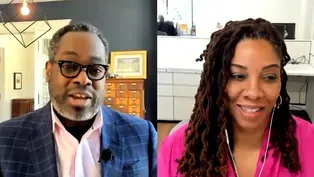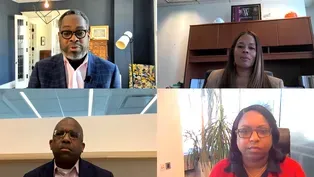
The barriers to entry for Black real estate developers
Clip: Season 51 Episode 12 | 8m 53sVideo has Closed Captions
Black real estate developers discuss the barriers to entry in the real estate industry.
American Black Journal” host Stephen Henderson talks with three Black Detroiters in the real estate development industry about the process of getting development projects off the ground and completed. They discuss the racial wealth gap, a lack of access to capital, the risks involved in development, gaining the necessary experience, and other struggles that impact developers of color.
Problems with Closed Captions? Closed Captioning Feedback
Problems with Closed Captions? Closed Captioning Feedback
American Black Journal is a local public television program presented by Detroit PBS

The barriers to entry for Black real estate developers
Clip: Season 51 Episode 12 | 8m 53sVideo has Closed Captions
American Black Journal” host Stephen Henderson talks with three Black Detroiters in the real estate development industry about the process of getting development projects off the ground and completed. They discuss the racial wealth gap, a lack of access to capital, the risks involved in development, gaining the necessary experience, and other struggles that impact developers of color.
Problems with Closed Captions? Closed Captioning Feedback
How to Watch American Black Journal
American Black Journal is available to stream on pbs.org and the free PBS App, available on iPhone, Apple TV, Android TV, Android smartphones, Amazon Fire TV, Amazon Fire Tablet, Roku, Samsung Smart TV, and Vizio.
Providing Support for PBS.org
Learn Moreabout PBS online sponsorship- So every development is, has tons of risk, tons of struggle, a lot of moving pieces, and particularly when you're redeveloping a city.
Then you're kind of overcoming barriers that have made prior people not, you know, go after a certain project.
So you have all that and then you have this sense of- And sometimes it can be pretty nebulous, right?
It's where, it's what's going on here?
You know, it's, you know, it's a big part of development is the confidence that people have in the developer.
And that's where bias can be particularly introduced.
This sense of, are you able to do it?
You know, even once they believe that it can be done, which was a struggle for Detroit for years, then it's can you do it?
And so- And that's where it gets to be pretty nebulous.
But even some of the hard measurements of can you do it, then get back to kind of historical, you know, historical discrimination and how that affects people and where they are financially now.
And so it's one of the things I talk to new developers a lot about is something that everyday Americans just, you know, have a hard time just imagining.
There's a big measure that for commercial projects of a developer's liquidity.
And so that's this concept of extra money that you don't need and aren't using.
And so, you know, the idea of having any extra money that you don't need and aren't using just to handle problems, should they pop up.
Is something that most Americans don't experience and so, and disproportionately black and brown don't.
And so as you get into larger projects you need more and more liquidity.
And so being able to have that liquidity to convince banks that you are a competent risk is a big, big barrier.
And then partnering with that liquidity, if you don't have it yourself, in an equitable way is another barrier.
And so part of being a black or brown developer is bringing in that kind of historic lack of access to equity and capital and liquidity.
Into a process where you're trying to convince people to have confidence in your abilities and your financial wherewithal and achieving that in an equitable way.
- Ron, at Urge you've been really focused on trying to get black developers more opportunities, get more people, you know, prepared for the challenges that they're gonna face if they want to do- If they want to do those kind of things here in the city.
Talk about the barriers that you see that still exist and the kind of help that's available from Urge and other places.
- Yeah, thanks Stephen.
It's a real challenge and a real issue.
You know, I always just frame for folks, you know, to become a developer of size and scale, right?
It took me 20 years of working on Wall Street, right?
And saving a couple pennies here and there.
And that gave me a chance to start.
You know, often times I'm on a another conversation, I'll ask that question.
How many people can kind of match that?
Most people can say no, no matter what they look like, right?
And so if you could add on the historical challenge we have it makes it really challenging and hard.
And access to capital becomes a significant barrier for that, right?
Those historical barriers and lack of equity and home ownership.
When you add that compounding effect over generations, it adds up that most black and brown folks don't have an extra dollar.
Let alone half a million dollars, right?
To say, I will take a risk with an invest.
And so we have to find, create- One, we have to be real and acknowledge that is a real barrier and there's a real issue.
And if we acknowledge that's a real issue then what can we do to help solve that?
One, we try to help folks understand that you have to be as proficient, efficient, and effective and as knowledgeable, as talented as possible.
There is no, you know, there is no way to replace, are you good at what you do, right?
So whether it be through the Reed organization that I'm on a leadership team for as well as- Or just working with developers, you gotta have that as a starting point.
And if you have it as a starting point, then the question is how do we make this process easier for you?
And that was one of the reasons why we partnered with Investitrade and Kresge to launch Ebiara.
Which is the, kind of the first of its kind fund to invest in black and brown, not develop mid projects but the firms in itself.
Because it's a certain level of achievement when someone invests in your company.
And I always kind of make the analogy, no one in the, no one ever told the founders of Google we will only invest in a Google algorithm but you should work at Walmart and starve to death, or starve to death right?
However, you know, that's what they say to developers every day.
We'll invest in your product, but we don't care how you eat or survive.
Well, that's not a long-term solution for growth and scale and success.
And so Ebiara starts that process of providing that capital into the firms.
And that may end up going to projects, some of it will go into running the business.
But that gives you a leg forward and a push forward to give you- To let folks know that you are ready for that next level preparation.
And it eases the burden in some historical legacy challenges of maybe just not having the same access to capital as some of our peers may have.
And we think, we think that along with the wraparound support we provide by providing them guidance, exposure, access that we may have garnered.
That makes them much more successful.
- Jason, I wanna have you talk specifically about the area where your business focuses which is housing.
Which I feel like adds another level of difficulty, I guess, to the problem.
Number one, you are really focused on affordable housing, and housing that gives people access who didn't have it before.
But housing in general is also a riskier proposition I think sometimes in places like Detroit.
So tell me how these barriers that all black developers face in Detroit and around the country play out in your world of housing.
- So yeah, that's a great question.
You know, there are many challenges and barriers.
One is, you know, there are a lot of folks that don't necessarily know or think that purchasing a home is for them.
And I think that, you know, communicating that home ownership is for African Americans and black folks is something that's utterly important.
But besides just letting 'em know, it's also the education around it to allow them to be able to succeed.
So providing those services as it relates to credit repair and coaching and pre and post-purchase housing counseling, so that people are properly prepared for it.
Because, you know, in the city of Detroit we have a vast amount of single family housing and homes.
We also have a ton of renters.
I know that tide has changed a little bit.
But in the past- But the idea and the reality is that it is an 85% African American city.
We need to change that and turn that around to create more opportunity and show people that, you know, there is access to being a homeowner in a healthy safe neighborhood in the city of Detroit.
You can transition that to other heights going forward.
But you know, you're absolutely right that there are those challenges in the marketplace that we look to address by providing some of those services around people to provide them the access to be able to meet them where they are, to succeed, to move up.
And without providing that different information, you know, people don't think, necessarily think that's for them.
I started my career in property management doing you know, managing Martin Luther King homes, and affordable housing in the city.
And folks would, you know, turn 18 or 17 and go get an apartment not knowing that there's a career that they could have.
And then take that career to be able to have a house or a home to build a family, and raise it within a neighborhood and a community.
And that's something that we have to get back to, because at the end of the day in each neighborhood, you know, there has to be that spur of development.
So the little boys and girls that live there actually feel that they have a clean, safe opportunity to grow up in a neighborhood.
But also have a part of ownership in that neighborhood, which is utterly important.
The challenges Black women face in real estate development
Video has Closed Captions
Clip: S51 Ep12 | 3m 53s | Develop Detroit’s Sonya Mays on the barriers Black women face in real estate development. (3m 53s)
Closing the racial equity gap in real estate development
Video has Closed Captions
Clip: S51 Ep12 | 10m 38s | Organizations offer finances, resources to Black real estate developers in Detroit. (10m 38s)
Providing Support for PBS.org
Learn Moreabout PBS online sponsorshipSupport for PBS provided by:
American Black Journal is a local public television program presented by Detroit PBS













